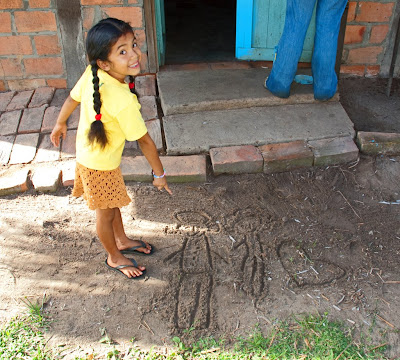The school is a long low concrete building with a zinc roof that bakes and crackles. The teachers and students are the bacon, curling limply at first until they begin to crisp (or wilt, if it’s cheap bacon) by early afternoon.
As you enter through the two-inch-deep sand at the back, there is an illusion of cool for a moment from the shade. Right and left respectively, facing each other, are the headteacher's office and the staffroom. The next pair is resource centre (donated 1990's American textbooks, punctured footballs and one warped and cracked cricket bat) and the lab (desks, bunsen burners with no gas, a few beakers with no water supply, and the teacher has to climb in over the wall as someone stole the key). Next pair is the first year A and B classrooms, then second year A and B, then third year A and B. Only two rooms remain, so fourth year A and B have been merged, and they study in the hallway. The last pair is fifth year (only 15 students because it’s public exam year), and the storage room, piled high with broken school desks.
The school day is four seventy-minute periods with a break between each. We begin the day at 8:30 by raising the flag, saying the pledge and the school prayer, and having announcements. I am introduced. I fidget and sweat in the morning sunlight. The children squint and grump, I can't tell whether at me or the sunshine. That is my induction- I am given the school manual to read later. It is handwritten, and rather good. Only two copies exist.
I start teaching at 8:40. Since I received the textbooks at 8:25, I had prepared an introductory lesson to use with each class. They stand up as I enter. There is no chalk, so I have to send a pupil out to find some. We're off- I draw a map of Britain, I draw my hobbies, I draw conclusions about how badly I've pitched this lesson. The children are used to rote learning, writing from the board, reading aloud together. I am used to reaction, individuation and activities. The next lesson I will shift pace. My Grade 2 class is 27 students for whom I have 8 textbooks. Children are never permitted to take a textbook home.
Later I ‘teach’ P.E. The school has one football and a volleyball net. There are no courts, and the children mainly run barefoot round the sandy schoolyard. Long jump suggested itself to me, in a schoolyard full of natural sandpits, and the students humour me until I allow them to go off and play football.
The day ends with a stern talk from the headteacher. This shocks me, after a day with disruptive, bubbly, but mainly sweet-natured children. One boy is called up for using primary school children as runners to break in to a shop and steal alcohol for him. Two girls are called up for disappearing all weekend, almost certainly to a brothel. Papayas and smiling children and macaws and mango juice all sound wonderful, yes, but it’s nobody but a fool’s paradise. ‘Sweet’ and ‘innocent’ do not always occur together. Brazilian miners’ camps nearby, goods to buy but very few sources of income, a tough schooling with so few job prospects at the end of it: what are the students to aspire to? No wonder the school takes its moral and formative responsibilities so seriously.




 I find myself strangely moved by the Big Books, many of which are hand-drawn. B is particularly taken with the alphabet- ‘A is for armadillo’- that classic way of mapping the ordinary which is such good shorthand for cultural difference. I type, while May, the headteacher, answers the question ‘Why is the project necessary?’ as follows:
I find myself strangely moved by the Big Books, many of which are hand-drawn. B is particularly taken with the alphabet- ‘A is for armadillo’- that classic way of mapping the ordinary which is such good shorthand for cultural difference. I type, while May, the headteacher, answers the question ‘Why is the project necessary?’ as follows: 
